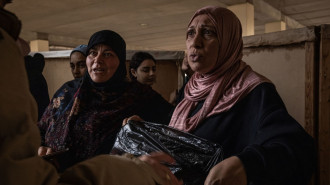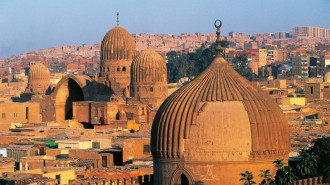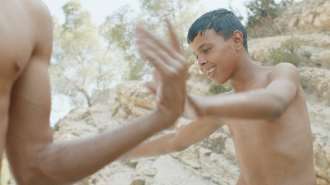
A decade on, Sisi's state-sponsored massacre at Rabaa continues to haunt survivors

A decade has passed since the Rabaa al-Adawiya Square protest, the six-week-long sit-in turned massacre.
Protesters demanded the restoration of democracy and the reinstatement of elected President Mohamed Morsi. They were, instead, met with a brutal crackdown by the Egyptian security forces.
Human Rights Watch labelled it one of the world's deadliest single-day demonstrations. Amnesty International reported 900 deaths, with thousands more wounded.
"I'm afraid of spraying or killing cockroaches or insects. When we hid between the walls, the helicopter sprayed gas to suffocate us while the snipers shot at us. I felt like we were insects"
Ten years have now passed since the Rabaa massacre yet the effects of August 14, 2013, remain embedded in the minds of the Egyptian psyche. The New Arab spoke with some of the day's survivors and how they have sought to cope with the trauma inflicted that day.
Denial and surrender
Sajda Abdel Nasser, whose father was killed at Rabaa, tried different ways to cope with his death. First Sajda went into denial, a period that lasted five years. She refused condolences and would look for him, or those that looked like him, in the street. Despite seeing her father's dead body, she believed that her father would return.
"My pain multiplied; I witnessed the massacre, and my father was killed," Sajda said to The New Arab.
That day, Sajda was separated from her father and unable to speak with him due to a communication blackout. "My father told me to look after my sister and find a way to seek refuge in the Rabaa mosque. No matter what happens, they [the Egyptian security forces] wouldn't be able to harm you while you're inside." When Sajda reached the mosque, despite gunfire enveloping the building. she found it filled with dead bodies.
Dealing with these memories has been painful for Sajda. "In the days following the massacre I couldn't eat and I took medications and sedatives for a while to sleep and not have nightmares. "Yet, flashbacks kept returning."
|
Sajda eventually decided to tell her story. On the one hand, she wanted people to know that her father was "an innocent man, killed without guilt." On the other hand, she found solace in sharing her feelings with her family, friends, and supporters on social media. "Sharing my story online helped me realise I needed to heal, I needed to find ways to lessen the sorrow and denial I experienced," Sajda said. But images of that day remain in her mind. "I can still describe the scenes of that day. I may have forgotten precise details, but some do still remain."
Sajda continues to talk about them today. "When my daughter plays around with a balloon and it pops, I can't stop screaming. I start crying when she falls to the ground," Sajda shared with The New Arab. Simple things, like cutting her fingers while cooking or having a blood test, now invoke extreme fear. "I can't bear the smell or sight of blood anymore. August is now a month I dread."
"I felt like I was in Palestine," Sajda said. "I'd heard stories about Palestine from my father, on that day, I thought I was in Palestine, not Egypt. There were planes above us, tanks in front of me, bullets flying, snipers on buildings, and hired thugs."
Silence as a remedy
Unlike Sajda, Imad prefers not to talk about Rabaa, where he was arrested at the end of the massacre. Whilst he shared his story with some of his fellow inmates and family, he "doesn't initiate the conversation," Imad told The New Arab. "The details of that day are complex. Sharing them all at once would be hard."
Imad refuses to document his testimony or narrate details to the media. He fears his detained brother will be subjected to more pain if he spoke. "I don't want to turn this day to bring further sadness. I don't want to halt my life and others at that painful moment. I want our lives to progress." The day may come when Imad feels comfortable to share but that day has yet to arrive. "Right now, I see it as just stirring up buried emotions. I prefer not to engage with it."
When The New Arab asked Imad if he remembers what happened that day, Imad frankly answered: "I remember everything from that day, moment by moment. I won't ever forget it. I can't forget scenes of people being killed by snipers next to me or my arrest at the end of the day after witnessing all that bloodshed in front of my eyes."
|
A heavy burden
"I feel like I'm always carrying a heavy load on my back, it's getting heavier with time. I can't bear the weight, I can barely walk," says Aya about Rabaa. "Our lives were changed forever."
Common household appliances now petrify her. "I can no longer sleep with a fan. It's been 10 years now and I can't bear the sound, especially above me. I still have nightmares of the helicopter that chased me."
"I'm afraid of spraying or killing cockroaches or insects. When we hid between the walls, the helicopter sprayed gas to suffocate us while the snipers shot at us. I felt like we were insects."
These fears now extend to Aya's three children. If one of her sons falls on their head, it takes her back to what happened at Rabaa: "I remember the image of a man being shot in the head, his head bursting in front of my eyes."
To deal with this trauma, Aya tried to ignore the news but it didn't work. "How can I forget? We've been suffering since that day," Aya told us.
The New Arab tried to reach out to six psychiatrists in London, Istanbul and across Europe to ask them about the psychological effect of Rabaa. Four of them declined for security reasons, despite not being Egyptian. Eventually, we found a psychotherapist who had a direct connection to the events of Rabaa, but in the end, they also declined. One of their relatives was killed that day and they themselves were dealing with the resurfacing of emotions 10 years on.
Shaimaa Elhadidy is an Egyptian investigative journalist and human rights defender based in Istanbul.
Follow her on Twitter: @salhadidy
![Up to 900 Egyptians, sympathetic to the Muslim Brotherhood, were massacred by the Egyptian security forces that day [Getty]](/sites/default/files/styles/medium_16_9/public/2023-08/GettyImages-176495659%20%281%29.jpg?h=65267471&itok=XEM9huqK)
![The massacre at Rabaa has marked a decade of authoritarian rule in Egypt [Getty]](/sites/default/files/styles/medium_16_9/public/2023-08/GettyImages-176492930.jpg?h=3ac079aa&itok=CdUtaP3B)
![Palestinians mourned the victims of an Israeli strike on Deir al-Balah [Getty]](/sites/default/files/styles/image_684x385/public/2024-11/GettyImages-2182362043.jpg?h=199d8c1f&itok=xSHZFbmc)


![The law could be enforced against teachers without prior notice [Getty]](/sites/default/files/styles/image_684x385/public/2178740715.jpeg?h=a5f2f23a&itok=hnqrCS4x)
 Follow the Middle East's top stories in English at The New Arab on Google News
Follow the Middle East's top stories in English at The New Arab on Google News


